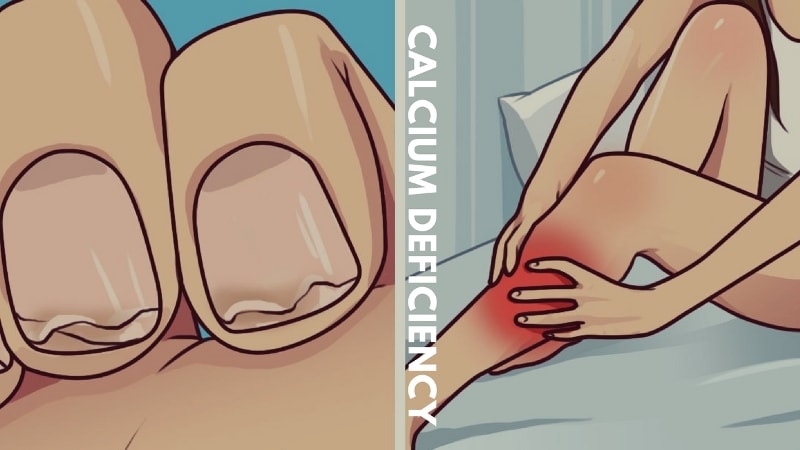
What you need to Know about Calcium Deficiency !
21-08-2017 | Posted By: Chhavi | 2947 View(s)
Were you ever scolded by your parents for not drinking milk? Well, most kids have! Almost every parent wants their children to drink milk daily as it is one of the best sources of calcium, and they are aware of the fact that calcium deficiency in the body can cause significant health problems.
Calcium performs many vital functions and is the most abundant mineral present in the human body. 99% of calcium in our body is found in our teeth and bones, while the remaining one percent is found in the blood, muscles and the fluid within our cells.
Why is Calcium Important?
Because it’s the most abundant mineral in the human body, it is vital to consume enough calcium for the healthy functioning of the body. Calcium makes up approximately 2% of your total body weight and performs many important functions such as preventing osteoporosis, keeping our bones and teeth, secretion of hormones, muscle contraction and muscle relaxation. Men and women should consume 1000 and 2000 milligrams of calcium daily respectively to prevent deficiency of calcium in the body.
Some of the Essential functions of Calcium are as follows:
1.It Keeps our Bones Healthy
As already stated above, 99% of calcium in the human body is found in teeth and bones; and hence calcium is highly essential to keep the bones healthy. There are so many health concerns which occur due to weak bones such as Osteoporosis, arthritis, muscle aches, joint pain, weak and brittle nails, etc. Thus, proper intake of calcium helps in keeping our bones healthy and strong, thereby controlling and preventing bone diseases.
2.It is helpful in Regulating Blood Pressure
Studies show that taking calcium supplements help lower systolic blood pressure in people with and without hypertension. Another research in the American Journal of Critical Nutrition revealed that men who consumed less calcium had high blood pressure than those without hypertension. Thus, proper consumption of calcium is required to keep the blood pressure level in control.

3.It reduces the PMS Symptoms
Women who intake adequate amount of calcium most often experience fewer symptoms of premenstrual syndrome such as anxiety, depression, headaches, irritability and cramps than those who don’t. So, girls do you skip taking milk every morning in the breakfast? Well, don’t know as it can save you the horror of experiencing the unbearable pain during menstruation.
4. Calcium helps you Stay Slim
Calcium boosts our metabolism, which in turn prevents weight gain. Studies suggest that calcium promotes more fat to be burned and less fat to be stored, which in turn aids in weight loss and also prevents weight gain.Dieticians suggest that cutting down calories and taking three servings of dairy on a daily basis can help you stay slim.
5.Calcium may Combat Cancer
Studies suggest that adequate intake of calcium may fight colorectal, breast and ovarian cancers. However, one must take calcium in a proper amount as according to certain studies, taking too much calcium (through supplementation) may increase the risk of prostate cancer. The National Cancer Institute does not recommend people to take calcium supplements to prevent cancer. The Institute suggests that taking adequate calcium through dietary sources is good for the human body.
What is Calcium Deficiency?
When the amount of calcium in the body is not adequate, it results in calcium deficiency. This condition is the result of less consumption of calcium through dietary sources over an extended period of time. Deficiency of phosphorus, magnesium and Vitamin D, all of which aids in calcium absorption, can also cause a dietary deficiency of calcium in the body
There are two kinds of Calcium Deficiencies:
Dietary Deficiency- This condition occurs as a result of inadequate calcium intake, which leads to depleted calcium stores in the bones which weakens the bones and causes osteoporosis.
Hypocalcemia- This condition occurs when there is less amount of calcium in the blood. It can occur due to the side effect of medications.
Signs and Symptoms of Calcium Deficiency:
It is crucial to look for the signs and symptoms of deficiency of calcium in the body, as lack of calcium in the body can cause significant health problems including Osteoporosis, Cardiovascular diseases, high blood pressure and cancer.
The Signs and Symptoms of Calcium Deficiency are:
1.Muscle Cramps
2.Dry and Brittle Nails
3.Irregular Menstruation
4.Yellow teeth and Tooth Decay
5.Difficulty Sleeping
6. Feeling anxious and Depressed
7.Fatigue
8.Coarse Hair
9.Chronic itching
10.Numbness and tingling sensations in the mouth and toes
11.Cataracts
12.Osteoporosis
Two Major Sources of Calcium:
1.Dietary Sources of Calcium
Calcium is required for people of every age to stay healthy and fit. According to the Institute of Medicine, here is how much calcium you need on a daily basis:
Age Male Female
0 to 6 months 200 milligrams 200 milligrams
7 to 12 months 260 milligrams 260 milligrams
1 to 3 years 700 milligrams 700 milligrams
4 to 8 years 1000 milligrams 1000 milligrams
9 to 18 years 1300 milligrams 1300 milligrams
19 to 50 years 1000 milligrams 1000 milligrams
51 to 70 years 1000 milligrams 1200 milligrams
Over 70 years 1200 milligrams 1200 milligrams
You can take calcium through calcium-rich foods or supplementation. It is important to increase the consumption of foods rich in calcium to prevent its deficiency. But, you must make sure that you choose foods which are fat-free or low in fat for the prevention of high cholesterol and heart diseases.

Here is a complete list of dietary sources of Calcium:
FOOD STD SERVING SIZE CALCIUM (MG)
Rump Steak (lean) 100g 5
Apples 1 medium 156g 7
Lamp Chop (lean) 100g 8
Bread – mixed grain 30g (slice) 15
Bread – wholemeal 30g (slice) 16
Chicken – roasted no skin 100g 16
Broccoli 60g 18
Strawberries 1 cup (145g) 19
Eggs – boiled 1 large (48g) 21
Baked Beans 100g 34
Oranges 1 medium (122g) 35
Apricots – dried 50g 35
Spinach 100g 50
Tahini 20g (1tbsp) 65
Soy beans (boiled) 100g 76
Custard 100g 100
Almonds 50g 110
Ice Cream 100g 133
Tofu (calcium set) 100g 150
Salmon – tinned, red 100g 220
Sardines – canned 100g 380
Cheese – mild 40g piece 300
Cheddar reduced fat 40g 2 slices 323
Cheddar Cheese 40g 2 slices 327
Yoghurt – Low- fat 200g (std tub) 316
Plain Yoghurt 200g (std tub) 390
Milk – regular 250ml (std glass) 285
Milk- Reduced fat 250ml (std glass) 352
Milk – skim 250ml (std glass) 320
Milk – calcium fortified 250ml (std glass) 353

2.Calcium Supplements
If you are not able to get a proper amount of calcium which is required for the body from the diet, you may be recommended by your Doctor to take calcium supplements. You can take calcium supplements in tablet, liquid and chewable forms. These supplements are used to cure conditions that can cause hypocalcaemia. But, you must not take calcium supplements without consulting a Doctor as excessive consumption of these supplements can increase the risk of kidney stones and cardiovascular diseases.
In a nutshell, consumption of vitamin is important to have a healthy body. Thus, eat plenty of calcium-rich foods; and if you experience any of the symptoms of calcium deficiency as mentioned in the blog, do Consult a Doctor.


